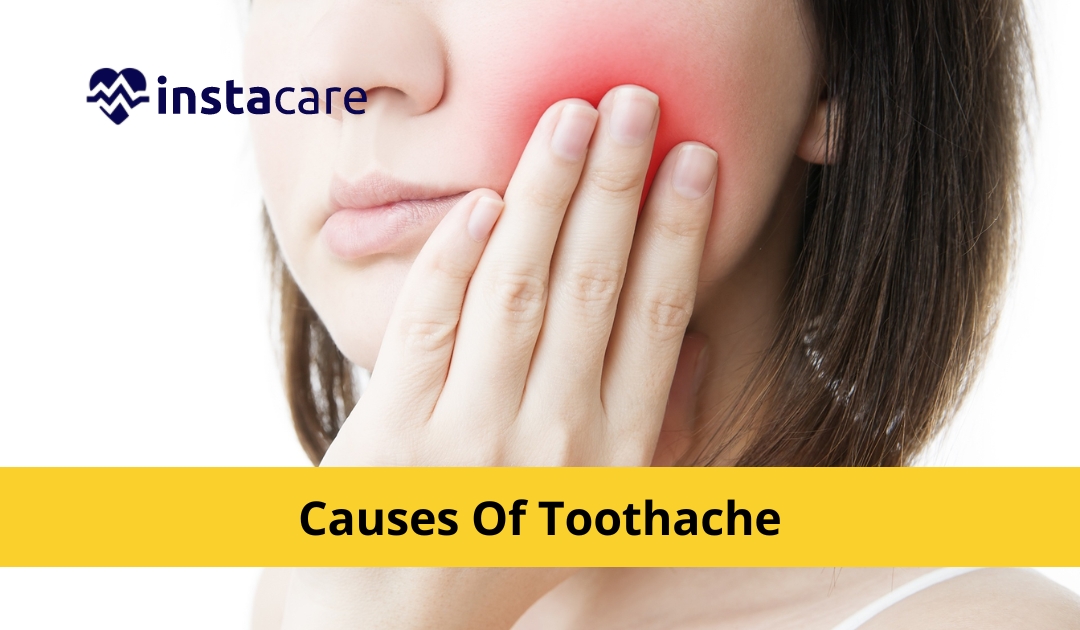Nothing can be more unpleasant than a toothache. It is estimated that nearly one-third of adults suffer from some form of dental pain, ranging from mild to severe. As if the discomfort isn’t enough, it also affects your daily routine and may even stop you from going about your normal activities due to chronic oral pain. In this blog post, we will discuss some common causes of toothaches as well as methods for treating them in an effort to keep your teeth healthy and free from any type of pain!
What is a toothache?
A toothache is a common yet agonizing type of dental discomfort that can affect anyone, regardless of age or oral hygiene. It occurs when nerves in the pulp, the innermost part of the tooth structure, become inflamed, damaged, or irritated, and may be influenced by a variety of factors. These may include bacterial infections, tooth decay, trauma or injuries, and gum diseases, among others.
The intensity and persistence of a toothache can vary significantly for each individual and may be accompanied by other symptoms such as swelling or tenderness around the tooth, fever, and difficulty chewing. Ignoring a toothache not only prolongs the unbearable pain but also further compromises oral health and could potentially lead to more severe complications. For this reason, it is imperative to seek professional help from a dentist whenever you experience a toothache to achieve relief and maintain a brilliant, pain-free smile.
Causes of toothache
1- Cavities or tooth decay
Undoubtedly, dental health is a crucial aspect of our overall well-being, and the nefarious phenomenon of cavities or tooth decay is a prevalent concern faced by many. These tiny yet menacing invaders stealthily tunnel their way through the enamel of our pearly whites, exploiting the vulnerabilities created by our fondness for sugary treats and less-than-perfect oral hygiene practices.
The ever-elusive nature of cavities brings with it a looming threat that can lead to severe dental problems if left unchecked. In a bid to combat these toothsome adversaries, arming ourselves with the right knowledge and engaging in meticulous oral care habits can go a long way in protecting our invaluable assets - our beautiful smiles. So, let us raise our toothbrushes high in unison to declare war against the insidious forces of cavities and tooth decay, asserting our unwavering commitment to embracing a life full of radiant grins and untroubled bites.
2- Infections due to gum disease
Gum disease, also known as periodontitis, is a prevalent oral health issue that often goes unnoticed until it's too late, leading to infections and potential injury to the teeth and gum tissue. This insidious condition can gradually progress, causing more than just the discomfort of painful, inflamed gums or unsightly tooth discoloration. The most alarming consequence of gum disease is the increased risk of infections that can spread beyond your mouth and impact your overall health.
Medical research has indicated that gum infections could be linked to life-threatening conditions such as heart disease, stroke, diabetes, and respiratory problems. As such, it is crucial that we take the necessary steps in our oral hygiene and dental care routines to prevent gum disease and protect our well-being. Regular dental check-ups can aid in the detection of gum disease, along with adopting proper brushing and flossing techniques, so that you can maintain a bright and healthy smile.
View More: Various Remedies For Toothache You Must Know About
3- Grinding or clenching of teeth during sleep
The grinding or clenching of teeth during sleep, known as bruxism, is a common yet often overlooked condition that can have substantial effects on a person's quality of life. This nighttime habit not only disrupts sleep patterns but can also lead to various dental issues over time, such as cracked or worn teeth, gum recession, and even tooth loss. Factors that contribute to bruxism range from stress and anxiety to sleep disorders and misaligned teeth.
Many people are unaware they have this condition until a partner or a dental professional brings it to their attention. Thankfully, modern dentistry offers several treatment options, such as custom mouthguards and relaxation techniques, to mitigate the negative impact of bruxism and promote better oral health. If you suspect you might be grinding your teeth while you sleep, a consultation with your dentist may be the key to finding relief and ensuring the longevity of your smile.
4- Tooth sensitivity
Tooth sensitivity is not only an uncomfortable experience, but it also points towards a deeper underlying dental issue—enamel erosion. This pesky dental concern arises due to the consumption of acidic drinks and foods, which slowly yet persistently eats away at the protective enamel layer of our teeth. When left unchecked, the erosion makes the dentin beneath the enamel more exposed, leading to those unpleasant sensations the moment we indulge in something too hot, cold, or sweet.
As our daily lives become filled with acidic culprits like soda, citrus fruits, and even seemingly innocent salad dressings, vigilance over dental health becomes all the more crucial. Taking preventative measures such as drinking water after consuming acidic items, using a straw for beverages, or reaching for a soft-bristled toothbrush can go a long way in warding off the discomfort of tooth sensitivity while protecting our cherished smiles.
5- Misaligned bite resulting from jawbone misalignment or crooked teeth
A misaligned bite, resulting from either jawbone misalignment or crooked teeth, can pose a distressing and sometimes even debilitating issue for those affected by it. Left unchecked, this oral condition can lead to significant complications in one's overall health and adversely influence the quality of their social interactions.
Moreover, this dental irregularity can manifest itself in various forms, such as overbites, underbites, and crossbites, to name a few. It is crucial for individuals experiencing any symptoms of such misalignments to seek professional dental care in a timely manner. Not only will addressing the issue improve your oral health, but it can also enhance your confidence and overall well-being. By pursuing the necessary treatment options, you can ensure a brighter smile and a much-improved bite, setting a strong foundation for long-lasting dental health.
6- Teeth trauma
Teeth trauma can occur in a myriad of situations, including sports injuries, falls, or accidents. When these distressing events happen, they can have both physical and emotional repercussions on those affected. Sports enthusiasts, whether professional or amateur, often find themselves facing the dreadful consequences of a sudden impact or collision, which can lead to chipped, cracked, or even knocked-out teeth.
Likewise, a simple trip or fall in daily activities may unexpectedly result in significant damage to one's pearly whites. Accidents, such as vehicular crashes or workplace mishaps, can also catch us off guard and leave us with painful reminders of the incident through dental trauma. It is crucial to be aware of such risks and take necessary precautions to minimize the likelihood of teeth trauma, as well as seeking prompt professional help when such unfortunate events do transpire.
7- Gum disease
Gum disease, a common dental issue faced by many individuals, often goes undetected due to a lack of awareness about its symptoms and ways to maintain good oral health. Early recognition of gum disease symptoms, such as redness, swelling, bleeding gums while brushing or flossing, persistent bad breath, or receding gums, plays a crucial role in effectively managing and treating it.
By incorporating simple yet powerful habits into our daily routine, like proper brushing and flossing techniques, using a fluoride toothpaste, investing in a quality toothbrush, and not forgetting to schedule regular dental check-ups, we can greatly improve our oral health and prevent the progression of gum disease. Taking a few minutes to educate ourselves about the early signs of gum disease, along with actionable steps towards better oral hygiene, can go a long way in preserving our overall health and brightening our smile for years to come.
8- Bruxism
Bruxism, a condition characterized by excessive teeth grinding or jaw clenching, can lead to various complications such as headaches, tooth damage, and even temporomandibular joint disorder (tmjd). To minimize discomfort and reduce jaw tension, it is essential to address the root causes of bruxism, which may include stress, dental misalignment, or sleep disorders. Developing effective stress management techniques, such as meditation, yoga, or therapeutic massages, can aid in relaxing the facial muscles and alleviating underlying anxiety.
In addition, seeking professional dental assistance to identify and rectify potential dental issues may help prevent further problems. Lastly, maintaining ergonomically sound sleep hygiene, incorporating relaxation practices before bedtime, and the use of a customized mouthguard can protect the teeth while promoting a serene night's rest, ultimately reducing the burden of bruxism on your overall oral health.
9- Abscessed tooth
An abscessed tooth is a painful dental condition that results from a bacterial infection, causing a pocket of pus to form in the mouth. The primary cause of this infection is often tooth decay, which breaks down the protective layers of enamel allowing bacteria to infiltrate the tooth's inner pulp. Additionally, gum disease and dental trauma may also contribute to the development of an abscess. It is crucial to address an abscessed tooth immediately, as neglecting it can lead to severe complications such as tooth loss, bone damage, and even systemic infections.
Dentists typically recommend a range of treatment options to address an abscess, including antibiotics to help eradicate the infection, drainage of the pus to alleviate the discomfort, root canal therapy to save the damaged tooth, and in extreme cases, extraction of the tooth may be necessary. Prevention through proper oral hygiene and regular dental visits is key to avoiding the distressing experience of an abscessed tooth.
10- Cracked or damaged tooth
Experiencing a cracked or damaged tooth can be both painful and distressing. As the delicate structures within teeth are exposed, sudden sensitivity may result, making it difficult to enjoy hot or cold foods or drinks. Furthermore, sharp edges created by the fracture can cause irritation and discomfort to the surrounding oral tissues.
It is imperative to promptly visit a dentist in order to prevent additional complications, such as infection or even tooth loss. Thankfully, advancements in dentistry now offer a variety of treatment options tailored to address the specific nature and extent of the damage. Receiving timely care helps to alleviate pain, safeguard oral health, and maintain a beautiful smile.
Symptoms of toothache
A toothache can be a truly discomforting experience, as it is often characterized by a sharp, incessant pain that seems to be pulsating within the mouth. The symptoms associated with toothache could range from mild to severe, gradually leaving you in a state of unease and unable to perform your daily activities. Subtle signs such as increased sensitivity to hot or cold food and beverages, an inexplicable metallic taste in the mouth, and tenderness experienced while biting down might serve as early indicators of toothache issues.
As the pain magnifies, you may find that the discomfort extends to your ears, jaw, or even the temple area. In some cases, visible signs like red and swollen gums, or an open sore near the aching tooth, can suggest the presence of an underlying dental issue. It is imperative that those experiencing toothache symptoms address them promptly, as neglecting dental health can lead to further health complications.
View More: All The Information You Need To Know About Laser Teeth Whitening
How do i treat a toothache
Toothaches can be an unwelcome visitor, leaving many individuals searching for effective remedies to alleviate their discomfort. The first step in addressing a toothache is to determine its source, as the root cause may vary from a simple cavity or food particle lodged between teeth to a more complex issue such as an abscess. If the pain is persistent or severe, it is critical to schedule an appointment with a dentist for evaluation and treatment. In the meantime, there are various at-home remedies that can temporarily provide relief.
One tried-and-true method is to rinse your mouth with warm salt water, which can help cleanse the affected area, reduce inflammation, and alleviate pain. Another option is to apply a cold compress on the outside of the cheek near the affected tooth, which can help numb the area and reduce pain. Over-the-counter pain medications like ibuprofen can also help in managing discomfort. Always remember that at-home remedies are no substitute for professional dental care, so never hesitate to consult with your dentist for guidance on the optimal treatment approach.
How can i prevent a toothache?
Toothaches can be incredibly painful and disruptive to your daily life, so taking steps to prevent them is a wise decision. Prioritizing oral hygiene and regularly visiting the dentist are the key lines of defense against toothaches. Make sure to brush your teeth thoroughly at least twice a day, floss to remove food particles from hard-to-reach areas, and incorporate mouthwash to eradicate harmful bacteria.
Another crucial measure to prevent toothaches is to maintain a balanced diet, limiting sugary foods and drinks that contribute to tooth decay. Staying hydrated will also help in washing away bacteria and strengthening gums. Finally, by scheduling regular check-ups with your dentist, you increase the chances of detecting and addressing any issues before they become painful toothaches. By incorporating these habits into your daily routine, you will not only lower the risk of a toothache but also enjoy better overall oral health.
Please book an appointment with the Best Dentist in Lahore, Karachi, Islamabad, and all major cities of Pakistan through InstaCare, or call our helpline at 03100002273 to find the verified doctor for your disease.
Source: https://instacare.pk/blog/causes-of-toothache-and-how-to-treat-them












